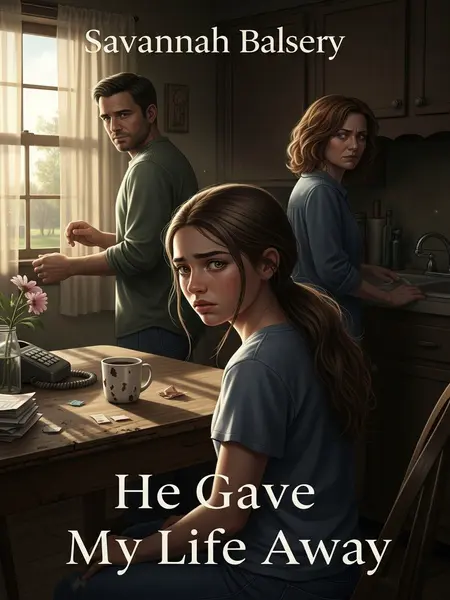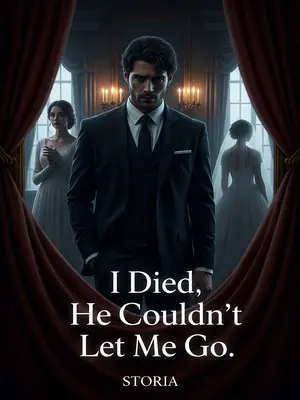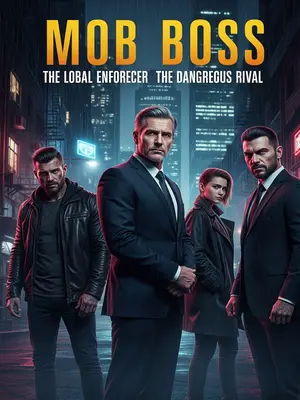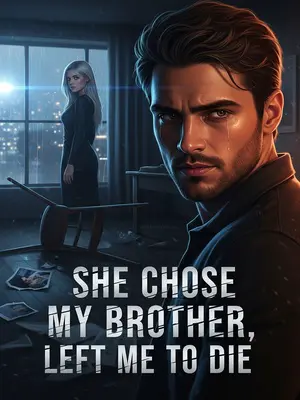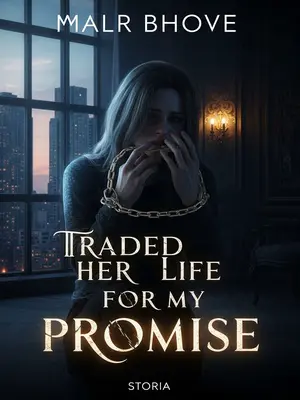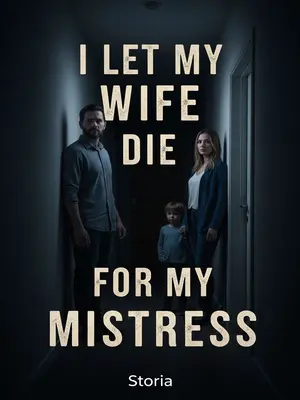Chapter 2: Sleeping With Disappointment
That night, my mom brought her bedding to my room, saying she didn’t want to talk to my dad for now. She set up her pillow next to mine and lay there staring at the ceiling. The silence was thick.
I looked at her, holding back the question I wanted to ask. The room was quiet except for the hum of the old window AC. I wondered if she could hear my heart pounding.
I wanted to know if she was serious about divorcing my dad. The word hung between us, unspoken. I didn’t dare ask.
But now that we’d gotten the money back, I figured they’d get over it, just like after every other fight. The cycle would start over, and nothing would really change. I felt a wave of disappointment.
It sounds awful, but part of me wanted something final. I wanted out.
As a daughter, when I heard my parents talk about divorce, I was ashamed to realize I felt a little excited. The thought made my heart race, half in fear, half in hope. Was that wrong?
I wondered if something was wrong with me. Was I a bad person for wanting out? The question gnawed at me.
But honestly, I didn’t like my dad. Not anymore. That realization hurt more than I expected.
It wasn’t always this way. When I was little, I longed for a loving father—what girl doesn’t? I used to watch TV dads and wish mine could be like that. I used to believe in fairy tales.
But after being let down again and again, that affection faded, replaced by resentment and frustration. I learned not to expect anything, and that made it easier to get by. Self-preservation, I guess.
Growing up, I met plenty of people, but I’ve never seen anyone like my dad—always generous to outsiders, willing to put his own family second. It was like we were invisible to him, just background noise. I wanted to shout, “What about us?”
No one would believe it if I told them—he treats strangers better than his own family. People would say, "But he’s so nice!" and I’d want to scream. They didn’t know the half of it.
He always says, "It’s not easy for them either," always thinking of others first. But never us. Never me and Mom.
Most people take care of their own first, but he gives away what little we have without a second thought. Our house always felt a little emptier because of it. The emptiness was almost physical.
I remember when I was little, every payday my dad would bring home a handful of candy after work. The smell of sugar would fill the kitchen, and I’d get excited, thinking maybe this time I’d get the first pick.
If he saw me playing at the street corner, he’d hand out candy to all the kids. Everyone else got two or three pieces—by the time it was my turn, there was only one left. I’d watch the other kids run off, pockets bulging, while I held my single piece tight.
The other kids were thrilled, but I always felt like crying. It felt like I was always last in line, even in my own family. I’d swallow the lump in my throat and pretend it didn’t matter.
I couldn’t understand—why did I get the least, when my dad was the one who bought it? Wasn’t I supposed to be special to him? The question haunted me.
I told my mom, and she scolded him, calling him a spendthrift. She pulled me into her lap and promised to buy me my own candy next time. I clung to that promise.
"Who buys candy and doesn’t save it for their own kid? And our Savannah only got one? What kind of dad are you?" she fumed, waving the empty wrapper at him.
"It’s just a few pieces of candy—no big deal," my dad said, unconcerned. He shrugged, like it was the most normal thing in the world. I wanted to scream.
"A few pieces? Have you ever seen any of the neighbors give Savannah candy?" my mom shot back, her voice sharp. The argument went in circles.
Back then, snacks were rare. Everyone hid what little they had for their own family, afraid others would see. It was a game of scarcity, and we always seemed to lose. I hated that game.
"They’re stingy. We shouldn’t be like them," my dad said, ruffling my hair. "Right, Savannah? We can’t be stingy."
Whenever neighbor kids or relatives visited, if my dad was home, he’d put out every snack we had. He’d lay them out on the coffee table like a buffet, grinning as the kids dug in. I watched, feeling left out in my own home.
Back then, everyone was poor—buying a couple of pounds of cookies was a luxury. My mom would save up coupons for months just to buy a box. Every treat was a big deal.
My dad would set out peanuts, pretzels, sunflower seeds—nothing fancy, but always gone by the end, making my mom anxious. She’d glare at the empty bowls, calculating how long until payday. I could see the worry lines deepen.
Once, my uncle brought over a box of kiwis—just six in total. They were bright green and fuzzy, something I’d only seen in magazines. I couldn’t wait to try one.
Kiwis were rare, even in the grocery store. I’d never had one. I stared at them for days, waiting for them to ripen, dreaming of the taste. It felt like forever.
A friend of my dad’s came over with his kid, and as they left, my dad handed them the whole box, telling them to take it home. I watched, stunned, as my treat disappeared out the door. I felt betrayed.
My mom’s eyes went red with anger, but she couldn’t say anything in front of guests. She bit her lip, her knuckles white. I saw the storm brewing.
I burst into tears: "That was from Uncle! I haven’t even had one!" My voice echoed down the hallway. I didn’t care who heard me.
My mom had told me to wait a couple days until they softened up. I’d waited so patiently, and it felt like it was for nothing. The disappointment was crushing.
Hearing me cry, the guest tried to give the kiwis back, but his kid clung to them, refusing to let go. I watched helplessly.
My dad waved them out the door. "Take them! It’s just some fruit—don’t make a big deal out of it!" He smiled, oblivious to my heartbreak. I wanted to throw something.
After that, my mom started hiding any treats so my dad wouldn’t find them. She’d tuck cookies behind the flour, fruit in the back of the fridge. It became a secret game.
In elementary school, some kids on the block got bikes—those cute little ones for kids. They’d race up and down the street, the bells jingling. I’d watch, wishing I had one, but I never asked my parents. My mom noticed, though. She always noticed.
On my eighth birthday, she gave me a pink bike with a bunny on it. I was so happy I wouldn’t let go, insisting on sleeping with it next to my bed, making my mom laugh. It was the best present I’d ever gotten. I thought maybe things were looking up.
A few days later, my uncle’s family visited. My cousin saw my bike and threw a tantrum for one of her own. She stomped her feet and screamed until her face turned red. I felt a knot form in my stomach.
My aunt sneered, "You’re just a country kid—how can you expect something so nice? Your cousin’s from the city, you can’t compare."
My dad couldn’t take it. "It’s just a bike—what are you even saying!" He looked offended, like she’d insulted his honor. He was always quick to give things away.
He patted my cousin’s head. "Ashley, I’ll give you this bike. Ride it home." He said it like it was the most generous thing in the world. My heart broke.
My cousin cheered up. She wiped her tears and grinned, already climbing onto the seat. I felt powerless.
I panicked, grabbing the handlebars and crying, "No! That’s my birthday present from Mom!" My voice shook, but no one seemed to care. I was invisible.
My mom tried to smooth things over, promising my cousin a bike next year, but she refused, insisting she wanted it now. She crossed her arms and stuck out her tongue. I wanted to scream.
In the end, my dad forced the bike away from me and gave it to her. I watched it roll away, my hands empty. The loss was physical.
As they left, my cousin stuck her tongue out at me. I felt like the world had turned upside down. Nothing made sense anymore.
I cried all night, feeling wronged and angry. My mom held me, whispering promises she couldn’t keep. I stopped believing in happy endings.
Back then, things were tight. That bike was something my mom had scrimped and saved for. It wasn’t just a toy—it was a symbol of her love. Losing it hurt more than I could explain.
With so many expenses, there was no way to buy another right away. The empty spot in my room reminded me every day. It felt like a wound that wouldn’t heal.
From then on, I couldn’t be close to my dad anymore. Something broke inside me. I put up walls, brick by brick.
I stopped running out to greet him after work, or climbing on him, calling, "Daddy." I kept my distance, building walls he couldn’t see. It was safer that way.
I never acted spoiled with him again. I learned to take care of myself. Independence became my shield.
My dad, oblivious, just sighed, "My daughter’s grown up—she’s calmer now." He never understood why. I stopped trying to explain.
